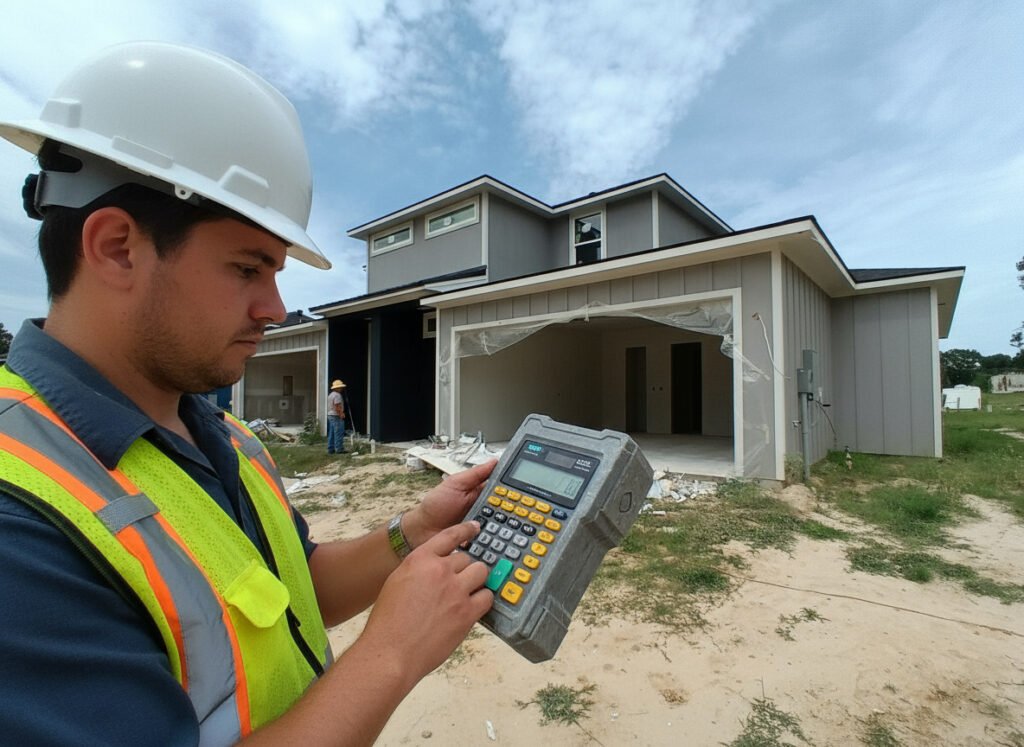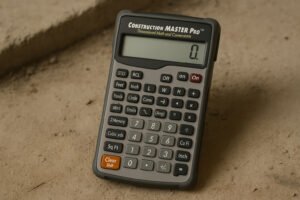Best Practices to use the Concrete Calculator Online
- Ensure the Depth matches your project type (sidewalks ≈ 4″, driveways ≈ 5–6″).
- Check if your supplier delivers in cubic yards (yd³).
- For irregular shapes, divide the area into rectangles and add the results.
- Length (ft): Total project length in feet. Example:
20 - Width (ft): Total width in feet. Example:
12 - Depth (in): Thickness in inches. Example:
4
1 foot = 12 inches
- Sidewalk
- Patio
- Driveway
- Garage Slab
This helps estimate the right type of concrete mix for residential projects.
- Standard – Regular mix used for most residential slabs.
- High Strength – Designed for heavier loads or high-traffic areas.
Not sure which one to pick? Choose Standard to start, or consult your contractor for load requirements.
📏 Example Calculation
| Input | Value |
|---|---|
| Length | 20 ft |
| Width | 12 ft |
| Depth | 4 in |
Formula:
20 × 12 × (4 ÷ 12) = 80 cubic feet
80 ÷ 27 = ≈ 2.97 cubic yards
✅ Pro Tip: The calculator already adds an extra 5% for waste and uneven surfaces.
2.97 × 1.05 = ≈ 3.12 cubic yards total
When to Use the Concrete Calculator Online for Driveways, Patios, Slabs, and Sidewalks
Our concrete calculator online is designed for a wide range of residential and light–commercial projects. Use it to estimate concrete volume for driveways, patios, garage slabs, and sidewalks—anywhere precision and strength matter.
For driveways, choose a thicker pour (typically 5–6 inches) to handle the weight of vehicles. Patios and sidewalks usually require around 4 inches of depth, providing a smooth, durable finish for outdoor living spaces and walkways. Garage slabs often match driveway strength for long-lasting performance under load.
If you’re planning a larger project or a new home construction, this tool is especially helpful during custom home building—it allows you to calculate accurate concrete needs before pouring foundations, slabs, and exterior flatwork, saving both time and material costs.
Need professional help with your custom home foundation or flatwork?
Visit our Custom Home Building page to learn how we bring your project to life from the ground up.
Why the Concrete Calculator Online Divides by 27
If you’ve ever wondered why the concrete calculator online divides the total volume by 27, here’s the reason—it’s all about converting cubic feet into cubic yards, the standard measurement used in the U.S. construction industry.
1️⃣ Concrete Is Measured in Cubic Yards
In the United States, concrete suppliers sell ready-mix concrete by the cubic yard (yd³), not by the cubic foot (ft³).
That’s because construction projects—like driveways, patios, slabs, and sidewalks—usually require large quantities, and using cubic yards makes it easier to order and price accurately.
2️⃣ The Math Behind It
Let’s start with a simple fact:
One yard equals 3 feet.
When you calculate a volume, you multiply length × width × depth.
So a cubic yard is actually: 1 yd3=3ft×3ft×3ft=27ft31 \text{ yd}^3 = 3 ft × 3 ft × 3 ft = 27 ft³1 yd3=3ft×3ft×3ft=27ft3
That means 1 cubic yard = 27 cubic feet.
Therefore, when your calculator finds the total volume in cubic feet, it divides that number by 27 to convert it into cubic yards.
3️⃣ Step-by-Step Example
Let’s say your concrete slab has these dimensions:
- Length: 20 ft
- Width: 12 ft
- Depth: 4 in
First, convert inches to feet:
4 ÷ 12 = 0.333 ft
Now calculate the volume in cubic feet:
20 × 12 × 0.333 = 79.92 ft³
Finally, convert cubic feet to cubic yards:
79.92 ÷ 27 = ≈ 2.96 yd³
That means you’ll need about 3 cubic yards of concrete for your project.
4️⃣ Why It Matters
Using cubic yards ensures your order matches what concrete suppliers deliver.
It also standardizes pricing, since most ready-mix trucks in the U.S. carry between 8 and 10 cubic yards of concrete per load.
By understanding the 27-factor conversion, you can:
- Get more accurate estimates.
- Avoid under-ordering concrete.
- Communicate better with suppliers and contractors.
✅ In Summary
| Conversion | Explanation |
|---|---|
| 1 ft³ | Basic unit for small measurements |
| 1 yd³ | 27 ft³ — standard concrete unit |
| Formula | Total ft³ ÷ 27 = cubic yards |
The division by 27 simply converts cubic feet into cubic yards, helping you order exactly what you need for your project—no more, no less.
Want More Control Over Your Concrete Calculations?

Are you the kind of builder who wants to fine-tune every detail?
Our new and improved Concrete Calculator Online gives you deeper control over your mix design and reinforcement planning.
Now you can:
- Adjust Compressive Strength (PSI): Choose between 2500, 3000, 3500, 4000, and 5000 PSI to match the exact performance your project requires.
- 2500 PSI – Light-duty indoor slabs or mild climates.
- 3000 PSI – Perfect for sidewalks and patios. This recommendation is supported by local municipal standards12
- 3500 PSI – Standard for driveways and garage slabs.
- 4000–5000 PSI – High-strength mixes for heavy loads or cold regions.
- Refine Rebar Spacing and Waste: Adjust bar size, spacing, and even steel waste percentage for accurate reinforcement estimates.
- Preview and Print Results: Generate a clean printable summary of your calculations — ideal for field planning, quotes, or client presentations.
- See Recommendations Instantly: The calculator now suggests the right concrete strength and usage type based on your PSI selection, helping you make smarter, faster decisions on-site.
This feature-packed upgrade was developed to make every project — from patios to full custom home building — easier to plan and execute with precision.
🔧 Ready to explore the enhanced version?
Try the new calculator now and discover how simple, accurate, and powerful project estimating can be.
Final Thoughts: Build with Accuracy and Confidence
Knowing exactly how much concrete your project requires is the first step toward a successful build. Whether you’re pouring a driveway, patio, slab, or sidewalk, using a reliable concrete calculator online helps you plan better, reduce waste, and save money.
Accurate measurements mean fewer surprises during delivery and a smoother construction process from start to finish. It’s the same attention to detail we bring to every project at East Texas Construction — from small repairs to complete custom home building projects.
Ready to turn your numbers into reality?
Contact our team today for a free estimate and let’s make your next concrete project strong, efficient, and built to last.
References
- Texas Department of Housing and Community Affairs (TDHCA). Texas Minimum Construction Standards (TMCS). Available at https://www.tdhca.state.tx.us/single-family/training/docs/14-TMCS.pdf ↩︎
- City of Cleburne, Texas. Code of Ordinances, § 154.084(C)(4)(d) (requiring 28-day strength of 3,000 psi for sidewalks) ↩︎



